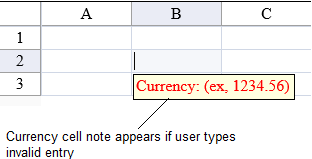You can use currency cells to restrict users to entering currency values and to display data as currency values. The currency cell has a default error message that is displayed if the user types an invalid value and tries to leave the cell. This message can be changed using the properties for the currency cell class.
By default, Spread uses the regional Windows settings (or options) for the formatting of currency. The CurrencyCellType class does not use the NumberFormatInfo property inherited from the GeneralCellType. The currency cell type always uses the System.Threading.Thread.CurrentThread.CurrentCulture. These settings are:
You can specify an edit format with the EditMode property and the CurrencyCellType.EditModeSettings class.
For details on the properties and methods for this cell type, refer to the CurrencyCellType class.
See how to define the limits for values at Limiting Values for a Currency Cell.

| C# |
Copy Code
|
|---|---|
FarPoint.Web.Spread.CurrencyCellType currcell = new FarPoint.Web.Spread.CurrencyCellType();
currcell.MinimumValue = 1;
FpSpread1.ActiveSheetView.Cells[1,1].CellType = currcell;
|
|
| VB |
Copy Code
|
|---|---|
Dim currcell As New FarPoint.Web.Spread.CurrencyCellType() currcell.MinimumValue = 1 FpSpread1.ActiveSheetView.Cells(1,1).CellType = currcell |
|
| C# |
Copy Code
|
|---|---|
FarPoint.Web.Spread.CurrencyCellType c = new FarPoint.Web.Spread.CurrencyCellType(); System.Globalization.NumberFormatInfo nfi = new System.Globalization.NumberFormatInfo(); nfi.CurrencyDecimalDigits = 3; nfi.CurrencyDecimalSeparator = ","; nfi.CurrencySymbol = "$"; c.NumberFormat = nfi; FpSpread1.ActiveSheetView.Cells[0, 0].CellType = c; FpSpread1.ActiveSheetView.Cells[0, 0].Value = 234.567; |
|
| VB |
Copy Code
|
|---|---|
Dim c As New FarPoint.Web.Spread.CurrencyCellType Dim nfi As New System.Globalization.NumberFormatInfo nfi.CurrencyDecimalDigits = 3 nfi.CurrencyDecimalSeparator = "," nfi.CurrencySymbol = "$" c.NumberFormat = nfi FpSpread1.ActiveSheetView.Cells(0, 0).CellType = c FpSpread1.ActiveSheetView.Cells(0, 0).Value = 234.567 |
|